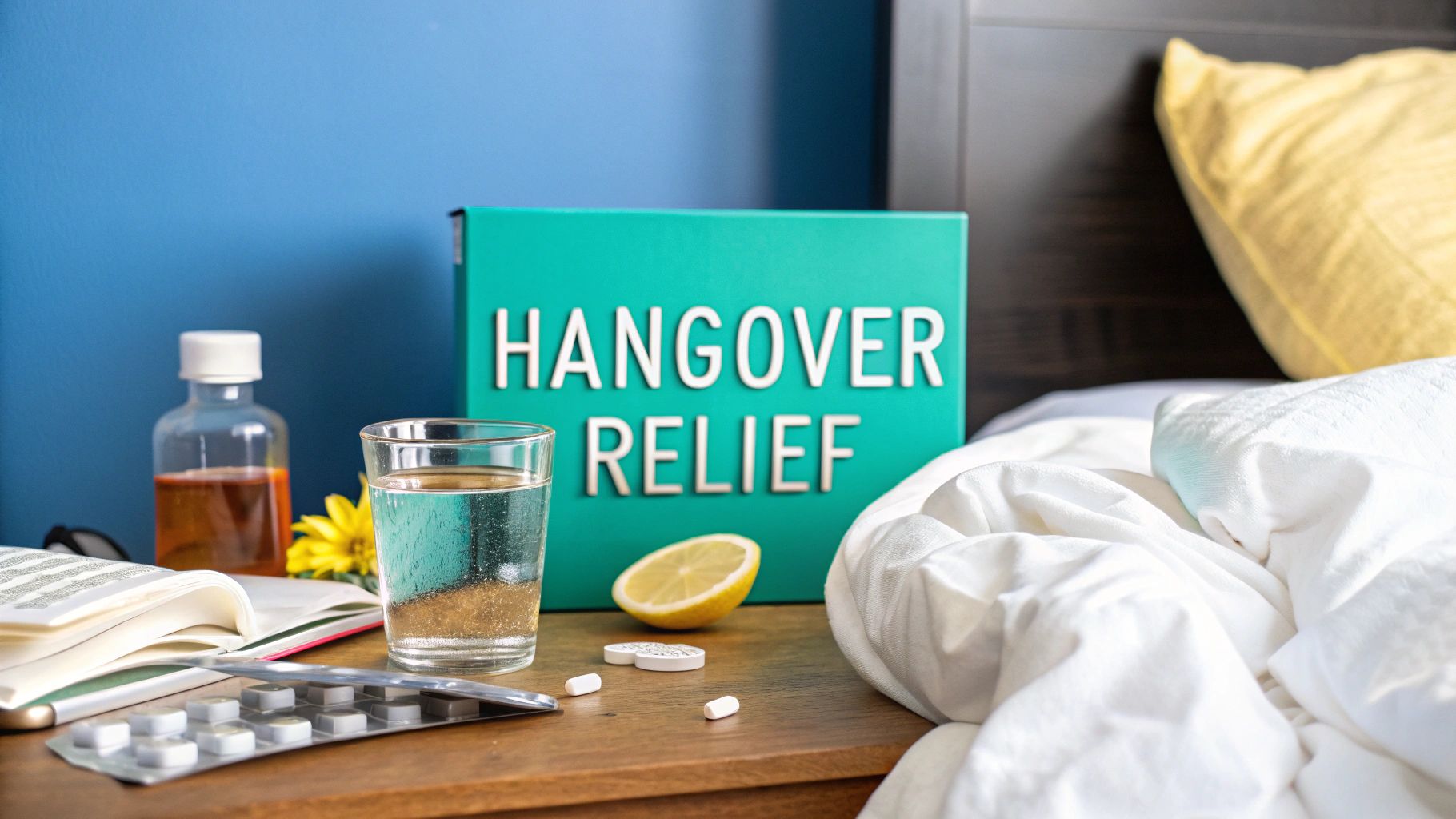

· By Annemarie
Hangover Symptoms: Causes, Relief Tips & More
Waking Up on the Wrong Side of the Bed?
Suffering from hangover symptoms? This listicle covers seven common indicators you're experiencing the after-effects of alcohol, from headache and nausea to fatigue and dizziness. Understanding these symptoms helps you manage discomfort and make informed choices about your well-being. We'll explore the science behind each symptom and offer practical tips for quicker recovery. This guide will help you identify and understand those dreaded hangover symptoms so you can get back to feeling your best.
1. Headache
One of the most common and dreaded hangover symptoms is the headache. Often described as a throbbing, pounding pain, a hangover headache typically affects both sides of the head. This unpleasant sensation results from a combination of factors, primarily alcohol's dehydrating effects, the resulting inflammation, and the vasodilation (widening of blood vessels) that occurs in the brain. Alcohol acts as a diuretic, meaning it increases urine production. This causes the body to lose fluids and electrolytes, leading to dehydration, a key contributor to hangover headaches.
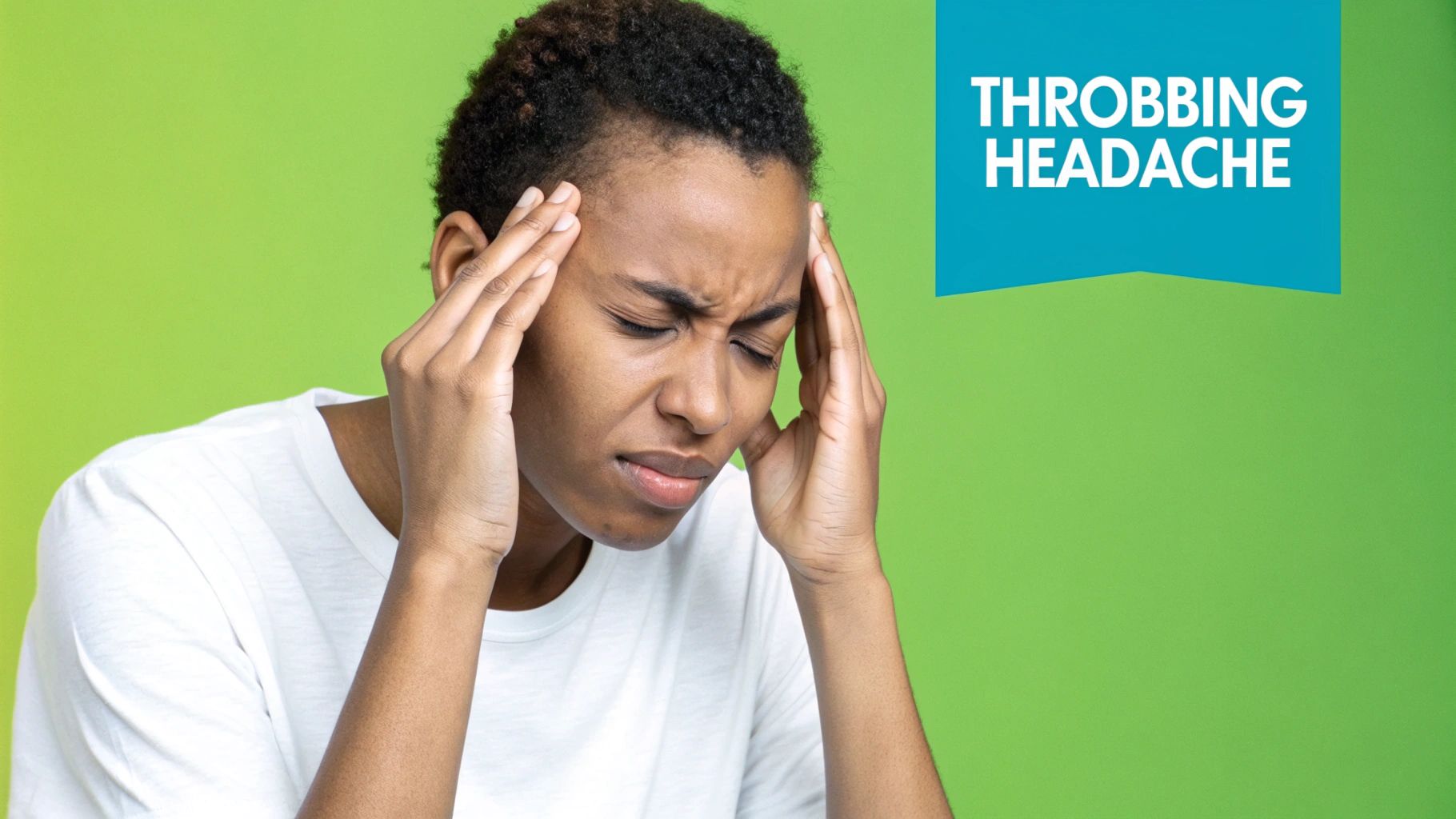
Hangover headaches have distinct characteristics. They are typically bilateral (affecting both sides of the head), have a pulsating or throbbing quality, and are often worsened by physical activity or movement. The severity can range from mild to severe, sometimes making even simple tasks difficult. While most hangover headaches resolve within 24 hours without medical intervention, they can significantly disrupt daily activities. The pain can be debilitating, preventing work, socializing, and general enjoyment. Furthermore, hangover headaches are often accompanied by sensitivity to light and sound, compounding the discomfort. They can also be resistant to standard pain relievers, making relief elusive.
Think of the classic "morning after" pounding headache following a night of celebration. Post-celebration headaches after events like New Year's Eve or birthday parties are prime examples of this common hangover symptom. For some individuals, these headaches can be so severe they resemble migraines. For those who experience migraine pain, exploring alternative management strategies can be beneficial. Some people find alternative remedies helpful in managing migraine pain, such as CBD oil for migraines as detailed by SMOKO CBD.
While unpleasant, the headache serves as a stark reminder of the consequences of excessive alcohol consumption, acting as a potential deterrent for future overindulgence. To mitigate the severity of hangover headaches, or prevent them altogether, here are some actionable tips:
- Hydrate: Drink plenty of water before, during, and after alcohol consumption. This helps counteract alcohol's dehydrating effects.
- Choose your pain reliever wisely: Opt for a non-NSAID pain reliever like acetaminophen. Avoid ibuprofen and aspirin, as these can irritate the stomach, which is often already sensitive after a night of drinking.
- Cold Compress: Applying a cold compress to the forehead can provide some relief.
- Rest: Find a dark, quiet room to rest and allow your body to recover.
The headache's inclusion in the list of hangover symptoms is undeniable; it's a frequent and impactful consequence of excessive alcohol consumption, impacting a wide range of individuals from social drinkers to busy professionals. Understanding its causes, characteristics, and management strategies is crucial for minimizing its disruptive effects and promoting overall well-being after alcohol consumption.
2. Nausea and Vomiting
Nausea and vomiting are common and unpleasant hangover symptoms. This gastrointestinal distress is a direct result of alcohol's impact on your body. Alcohol irritates the stomach lining (gastritis), leading to inflammation and increased acid production. Furthermore, alcohol is metabolized into acetaldehyde, a toxic substance that further triggers the body's nausea response. The stomach also empties more slowly after alcohol consumption, exacerbating these feelings of discomfort. This combination of factors makes nausea and vomiting a hallmark of the hangover experience, earning it a prominent place on the list of hangover symptoms.
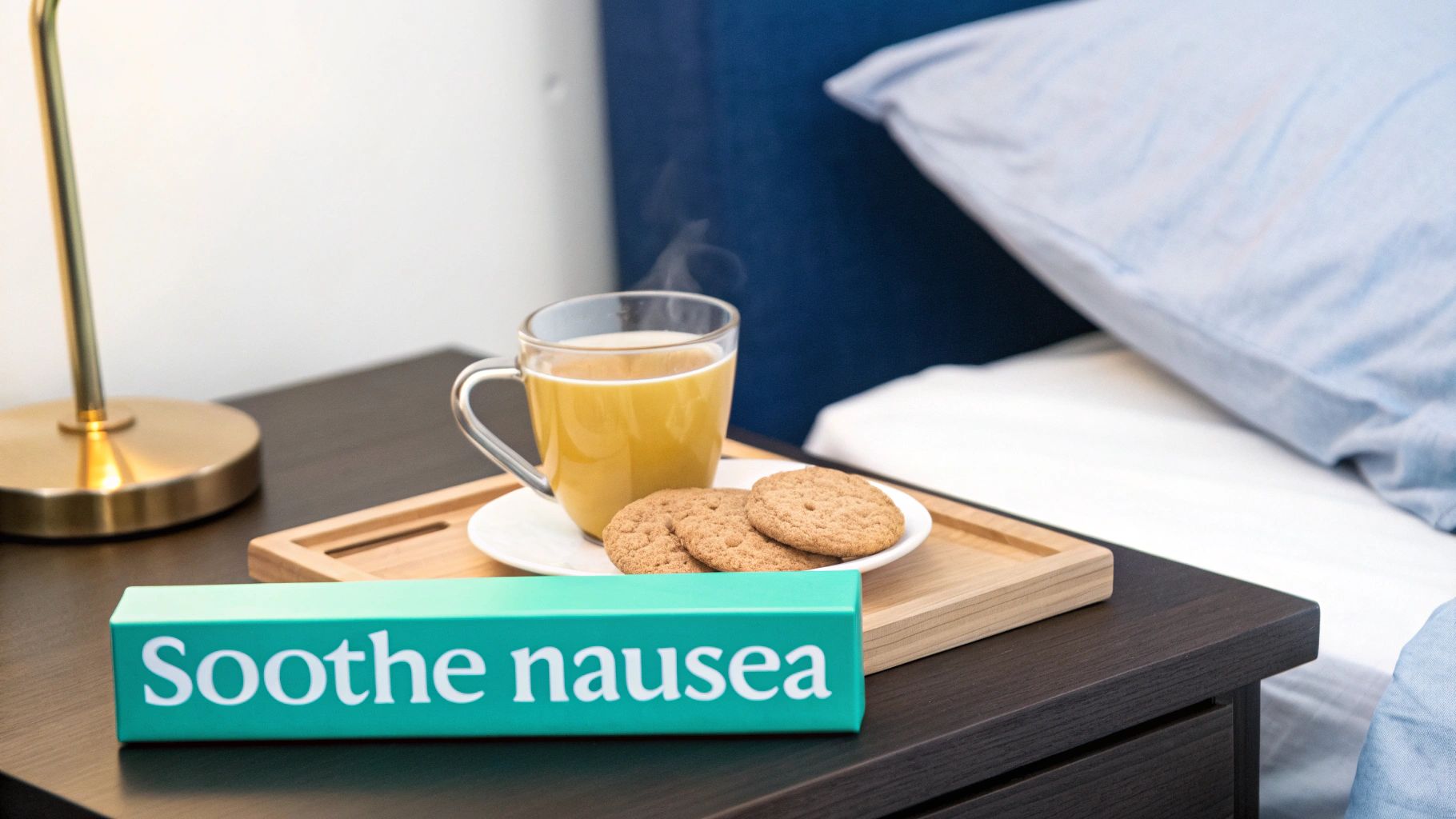
This queasiness can range from a persistent feeling of unease to dry heaving or full-blown vomiting. Movement and food intake often worsen the symptoms, and a loss of appetite typically accompanies the nausea. While unpleasant, vomiting can eliminate remaining alcohol and toxins from your system, acting as a natural (though harsh) deterrent to excessive drinking. However, this "benefit" is significantly outweighed by the negative consequences. Vomiting can further dehydrate you, irritate or even damage your esophagus, and disrupt your electrolyte balance. Not to mention, it's socially embarrassing. Experiences range from the classic "hugging the toilet" scenario to a morning sickness-like nausea that lingers throughout the day. For those seeking relief, Learn more about Nausea and Vomiting for helpful tips.
Features of Hangover Nausea and Vomiting:
- Persistent feeling of queasiness
- May progress to dry heaving or vomiting
- Often worse with movement or food intake
- Usually accompanied by loss of appetite
Pros:
- Vomiting can eliminate remaining alcohol from the system
- Acts as a natural deterrent to excessive drinking
Cons:
- Can lead to further dehydration
- May cause esophageal irritation or damage
- Can disrupt electrolyte balance
- Socially embarrassing
Tips for Managing Nausea and Vomiting:
- Hydration is key: Sip clear fluids slowly to prevent dehydration. Avoid chugging, as this can further upset your stomach.
- Bland foods: Try bland foods like toast or crackers to help absorb excess stomach acid and settle your stomach.
- Ginger: Ginger tea or candies can be a soothing remedy for nausea.
- Avoid aggravating foods: Steer clear of greasy or spicy foods until your symptoms subside.
- Over-the-counter medication: Consider an over-the-counter anti-nausea medication like dimenhydrinate (Dramamine) if your nausea is severe. Always follow the instructions on the packaging.
Whether you're a social drinker, a nightlife enthusiast, a health-conscious individual, a busy professional, or a frequent traveler, understanding hangover symptoms like nausea and vomiting can help you make informed choices about alcohol consumption and manage the after-effects more effectively.
3. Fatigue and Weakness
One of the most common and debilitating hangover symptoms is profound fatigue and weakness. This exhaustion isn't simply tiredness; it's a deep-seated lack of energy that can significantly impact your day. This unpleasant after-effect of alcohol consumption stems from a combination of factors. Alcohol disrupts your sleep architecture, preventing you from achieving truly restorative REM sleep, even if you manage to sleep for a longer period. Your body also expends considerable energy metabolizing alcohol, a process that takes a toll on your physical resources. Furthermore, alcohol triggers an inflammatory response in the body, further contributing to feelings of exhaustion. Finally, dehydration and the resulting electrolyte imbalances exacerbate these effects, leaving you feeling drained and weak.
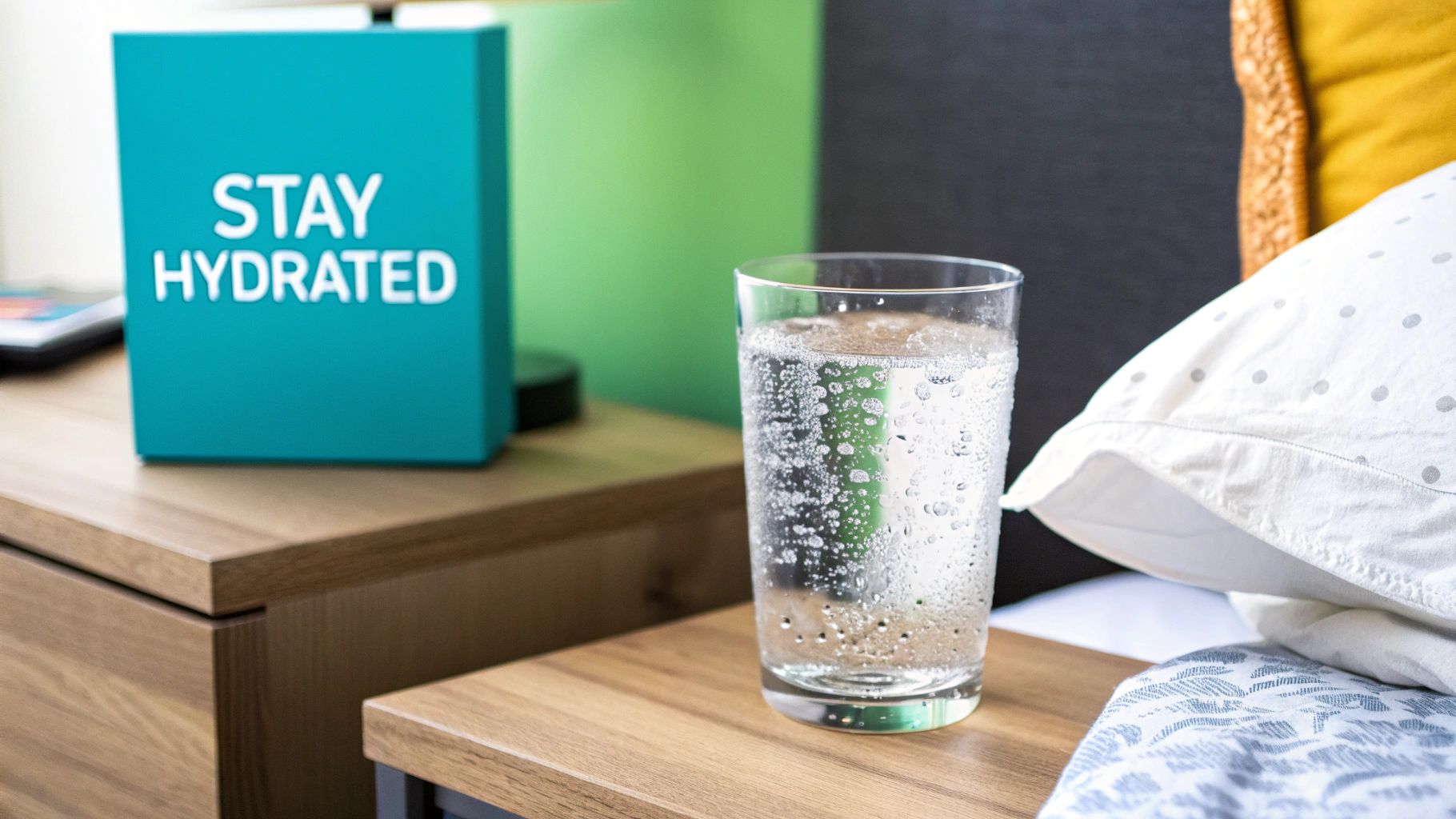
This intense fatigue deserves its place on the list of hangover symptoms due to its pervasive nature and potential to disrupt daily life. The characteristic features of this hangover symptom include excessive tiredness despite seemingly adequate sleep, muscle weakness, a general lack of energy and motivation, and decreased physical performance and endurance. You might feel like you can’t lift a finger, let alone perform at your usual physical or mental capacity.
While this forced rest can be beneficial for allowing your body to recover, the fatigue associated with a hangover can have significant downsides. It can severely impact work performance and productivity, leading to missed deadlines or the need to call in sick. Furthermore, attempting to operate machinery or drive while experiencing this level of fatigue can be dangerous and lead to accidents. Perhaps most frustratingly, hangover-related fatigue can sometimes last longer than other hangover symptoms, prolonging the recovery period.
Pros:
- Forces rest which can aid recovery
- Usually resolves completely with proper hydration and rest
Cons:
- Can impact work performance and productivity
- May lead to accidents if operating machinery or driving
- Can last longer than other hangover symptoms
Examples of hangover-related fatigue:
- Inability to get out of bed the morning after drinking
- Calling in sick to work after a night of heavy drinking
- Decreased athletic performance the day after alcohol consumption
If you're experiencing hangover-related fatigue and weakness, here are some actionable tips to help you recover:
- Rest adequately, but avoid oversleeping: While rest is crucial, excessively long sleep can sometimes worsen hangover symptoms. Aim for a normal sleep duration.
- Rehydrate with electrolyte-containing beverages: Replenishing lost fluids and electrolytes is vital for combating fatigue. Sports drinks or electrolyte-enhanced water can be helpful.
- Consider a B-vitamin supplement: Alcohol depletes B vitamins, which play a key role in energy production. A B-vitamin supplement may help restore these levels.
- Take a short walk in fresh air: Light exercise can increase oxygen flow and help alleviate fatigue. A short walk can make a noticeable difference.
- Eat complex carbohydrates for sustained energy: Choose foods like whole grains, fruits, and vegetables to provide your body with a steady source of energy.
This information is intended for general knowledge and informational purposes only, and does not constitute medical advice. If you have concerns about your alcohol consumption or experience severe or persistent hangover symptoms, it is essential to consult a healthcare professional. They can provide personalized advice and address any underlying health issues.
4. Dehydration: A Major Culprit in Hangover Symptoms
Dehydration is a cornerstone of hangover misery. It's not just a symptom itself, but a key mechanism driving many of the other unpleasant effects you experience after a night of drinking. Alcohol acts as a diuretic by inhibiting the production of antidiuretic hormone (ADH). ADH normally signals your kidneys to conserve water. When alcohol suppresses ADH, your kidneys go into overdrive, flushing out fluids at an alarming rate. For every alcoholic beverage you consume, your body can expel up to four times that amount in urine. This rapid fluid loss disrupts the delicate balance of electrolytes and impacts nearly every bodily system, contributing significantly to the overall hangover experience. This is why dehydration deserves its place among the most significant hangover symptoms.
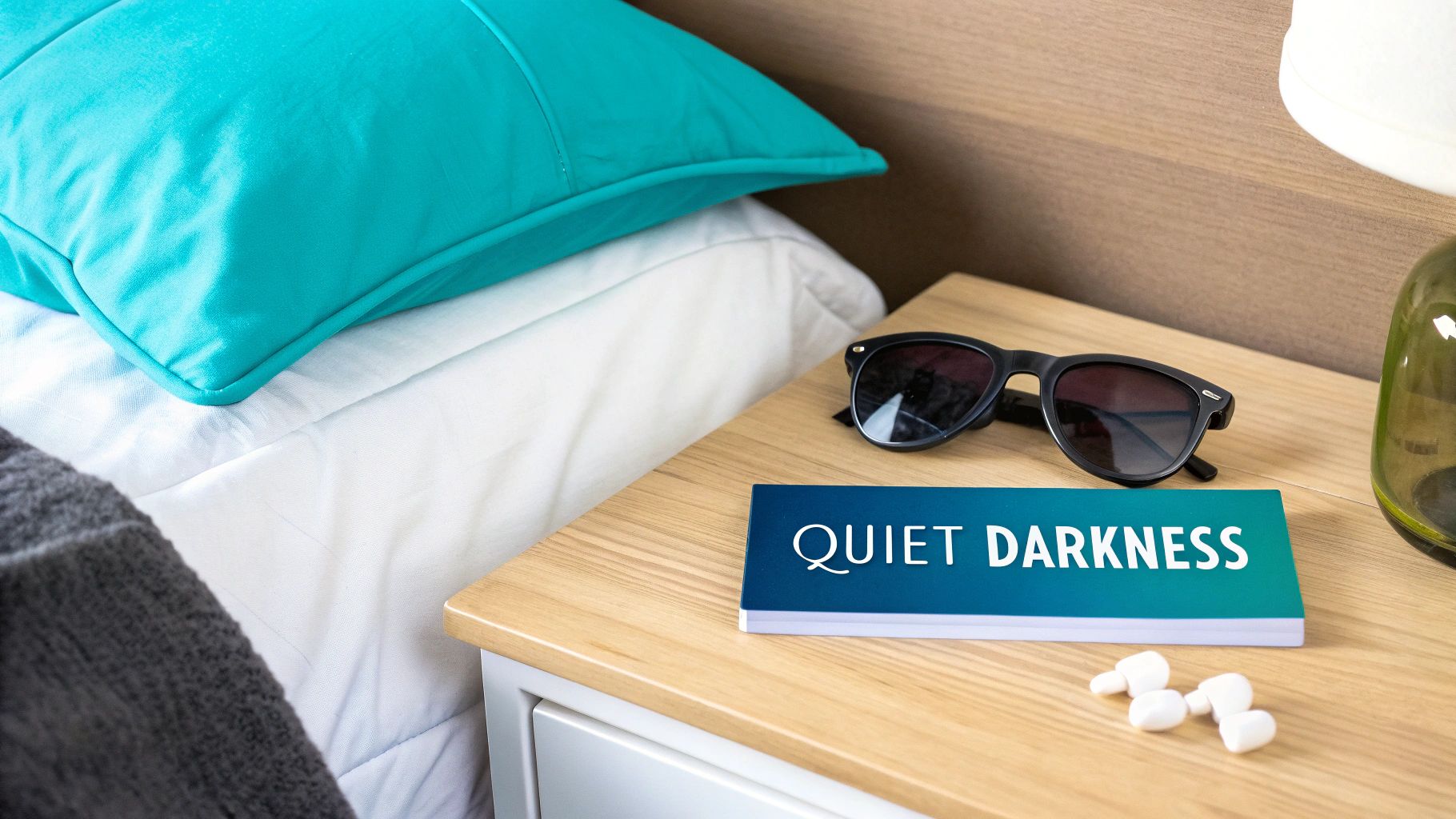
Dehydration manifests in several telltale signs. Excessive thirst, a parched mouth and throat, and decreased urination accompanied by darker urine are common indicators. Dizziness or lightheadedness, especially when standing up quickly, can also signal dehydration. Additionally, your skin might feel dry or appear flushed. Waking up with an overwhelming thirst after a night out or feeling dizzy when you get out of bed the next morning are classic examples of dehydration-related hangover symptoms. For social drinkers, nightlife enthusiasts, busy professionals, frequent travelers, and even the health-conscious individual who occasionally indulges, understanding the role of dehydration in hangovers is crucial.
While dehydration is unpleasant, it’s relatively easy to address compared to other hangover symptoms. However, if left unchecked, it can exacerbate other hangover symptoms like headaches and fatigue, and may even lead to electrolyte imbalances requiring medical intervention in severe cases. Learn more about Dehydration
Fortunately, preventing and treating dehydration is straightforward. Here are some actionable tips:
- Hydrate Before, During, and After: The golden rule is to drink one glass of water for every alcoholic beverage consumed. This helps maintain fluid balance throughout the night and minimizes the dehydrating effects of alcohol.
- Replenish Electrolytes: Sports drinks or coconut water can help restore lost electrolytes, particularly sodium and potassium, which are essential for proper bodily function.
- Hydrate with Food: Water-rich fruits like watermelon and cucumber can contribute to overall hydration.
- Avoid Caffeine: Caffeinated beverages can further dehydrate the body, so it's best to avoid them during a hangover.
- Monitor Urine Color: Pale yellow urine is a good indicator of adequate hydration. Darker urine signals the need to drink more fluids.
By understanding the role of dehydration in hangover symptoms and taking proactive steps to maintain fluid balance, you can significantly mitigate the unpleasant after-effects of alcohol consumption and enjoy a more comfortable recovery.
5. Increased Sensitivity to Light and Sound
Increased sensitivity to light (photophobia) and sound (phonophobia) is a common and often debilitating hangover symptom. This heightened sensitivity to sensory stimuli makes everyday sights and sounds feel overwhelming and contributes significantly to the overall misery of a hangover. Understanding why this happens and knowing how to manage these symptoms can make your recovery much more bearable. This heightened sensitivity deserves its place on the list of hangover symptoms due to its prevalence and significant impact on a sufferer's ability to function normally.
This unpleasant phenomenon stems from alcohol's impact on the central nervous system. Similar to the sensory overload experienced during a migraine, a hangover can leave your brain in a hyperexcitable state. Alcohol metabolization, coupled with inflammation of brain tissues and vasodilation (widening of blood vessels), contribute to this increased sensitivity.
Features of Light and Sound Sensitivity During a Hangover:
- Pain or discomfort: Exposure to normal or bright light can cause actual pain or a throbbing sensation in the head. Similarly, ordinary sounds can feel sharp, jarring, and irritating.
- Desire for quiet and darkness: Sufferers often crave dark, quiet environments as a refuge from the sensory onslaught.
- Behavioral changes: You might find yourself wearing sunglasses indoors, requesting others to speak quietly, or retreating to a darkened room. This can be disruptive to daily routines and social interactions.
- Accompanying headache: Often, this sensitivity is coupled with a pounding headache, compounding the discomfort.
Examples:
- Wincing at the sound of a ringing phone.
- Needing to wear sunglasses indoors the morning after drinking.
- Requesting that family members speak quietly.
- Feeling physically uncomfortable in brightly lit spaces.
Pros and Cons:
While there aren't true "pros" to experiencing this sensitivity, one could argue that it encourages behavioral changes like seeking restful environments, which can aid recovery. However, the "cons" significantly outweigh this:
- Makes normal daily activities challenging: From working on a computer to participating in conversations, this sensitivity makes everyday tasks difficult and uncomfortable.
- Contributes to irritability and mood disturbances: The constant bombardment of sensory input can lead to increased frustration, anxiety, and a generally low mood.
- May prevent sufferers from driving safely: Sensitivity to light can make driving hazardous, especially at night or on bright days.
Tips for Managing Light and Sound Sensitivity:
When experiencing these hangover symptoms, focus on creating a calming sensory environment:
- Rest in a dark, quiet room: This is the single most effective way to alleviate these symptoms.
- Use blackout curtains or an eye mask: Blocking out light can significantly reduce discomfort and promote rest.
- Wear sunglasses if you must go outside: Sunglasses provide a crucial barrier against bright sunlight.
- Use noise-canceling headphones or earplugs: These can help dampen irritating sounds and create a more peaceful environment.
- Avoid screens or use night mode/blue light filters on devices: The blue light emitted from screens can exacerbate light sensitivity and disrupt sleep patterns crucial for recovery.
By understanding the cause of increased light and sound sensitivity during a hangover and implementing these tips, you can effectively manage this unpleasant symptom and navigate your recovery more comfortably. This information is particularly relevant for social drinkers, nightlife enthusiasts, health-conscious individuals, busy professionals, and frequent travelers who may experience hangovers occasionally and need effective strategies to minimize their impact.
6. Dizziness and Vertigo: That Dreaded Spinning Sensation
Dizziness and vertigo are common and often unpleasant hangover symptoms. Experiencing these sensations after a night of drinking is a clear sign your body is struggling to recover. This involves feeling lightheaded, unsteady, or as if the room is spinning – a sensation known as vertigo. These disconcerting symptoms deserve a place on this list of hangover woes because they can significantly impact your ability to function the next day and even pose safety risks. Understanding why this happens and knowing how to manage it is crucial for anyone who enjoys an occasional alcoholic beverage.
The root causes of hangover-related dizziness and vertigo are multifaceted. Dehydration plays a significant role, disrupting the fluid balance in your inner ear, which is crucial for maintaining equilibrium. Alcohol's lingering effects on the vestibular system (the sensory system that contributes to balance and spatial orientation) further exacerbate the problem. Fluctuations in blood sugar and the dilation of blood vessels also contribute to these unpleasant sensations.
Features of Alcohol-Induced Dizziness and Vertigo:
- Vertigo: The sensation that the room is spinning, often triggered by changes in head position.
- Unsteadiness: Difficulty maintaining balance when standing or walking, sometimes requiring support.
- Lightheadedness: A feeling of faintness or near-syncope.
- Positional Changes: Symptoms may worsen with sudden movements or shifts in body position.
Pros (or rather, a silver lining):
- Temporary: The good news is that these symptoms are typically temporary and resolve as the hangover subsides.
- Enforced Rest: This unpleasant experience can act as a deterrent against engaging in potentially dangerous activities while still recovering.
Cons:
- Increased Fall Risk: Dizziness and vertigo significantly increase the risk of falls and accidents.
- Nausea Exacerbation: These sensations can trigger nausea or worsen pre-existing nausea.
- Impaired Driving: Operating machinery or driving is unsafe while experiencing dizziness and vertigo.
- Difficult to Disguise: These symptoms can be challenging to hide in social or professional settings.
Examples of Hangover Dizziness and Vertigo:
- Needing to hold onto walls for support when walking to the bathroom after a night of drinking.
- Feeling like the room is spinning when lying down with a hangover.
- Being unable to drive the morning after drinking due to balance issues.
Tips for Managing Dizziness and Vertigo:
- Move Slowly: Avoid sudden movements and changes in position.
- Hydrate: Replenish fluids lost during alcohol consumption to restore inner ear fluid balance. Water, electrolyte drinks, and broths are good choices.
- Stabilize Blood Sugar: Eat something containing complex carbohydrates, such as toast or oatmeal, to help stabilize blood sugar levels.
- Motion Sickness Medication: Consider an over-the-counter motion sickness medication if symptoms are severe. Always follow dosage instructions.
- Darkened Room: Lying down in a darkened room can help minimize sensory input and alleviate the spinning sensation.
Experiencing dizziness and vertigo as hangover symptoms is a common problem for many. By understanding the underlying causes and implementing these practical tips, you can effectively manage these unpleasant sensations and ensure a smoother recovery. If you are experiencing severe or persistent dizziness, consult a healthcare professional. Remember, prioritizing your well-being is key to enjoying a balanced lifestyle, even after a night out.
7. Cognitive Effects: The "Brain Fog" of a Hangover
Beyond the pounding headache and upset stomach, one of the most insidious hangover symptoms is the collection of cognitive effects often described as "brain fog." This mental malaise deserves its place on the list of hangover symptoms because it can significantly impact your daily life, often more so than the physical discomforts. Alcohol's impact on the brain extends well into the hangover period, affecting various aspects of cognitive function. This includes impaired concentration, memory deficits, a decreased attention span, and generally slowed thinking processes. If you've ever struggled to remember simple things, focus on a task, or make decisions the day after drinking, you've experienced the cognitive consequences of a hangover.
So, how does this "brain fog" happen? Several factors contribute to alcohol-induced cognitive impairment:
- Neurotransmitter disruption: Alcohol interferes with the delicate balance of neurotransmitters in the brain, affecting communication between brain cells.
- Inflammatory processes: Alcohol triggers inflammatory responses in the brain, which can further impair cognitive function.
- Sleep disruption: Even if you manage to get some sleep after a night of drinking, alcohol disrupts sleep architecture, leading to poor quality rest and contributing to cognitive impairment.
- Metabolic changes: Alcohol's processing by the body leads to metabolic changes that can also negatively affect brain function.
Features of Hangover-Related Cognitive Impairment:
- Difficulty concentrating or focusing
- Memory lapses or forgetfulness
- Reduced problem-solving ability
- Slower reaction times
- Decreased attention span
Pros and Cons:
While there's no upside to experiencing cognitive impairment, awareness of these effects can be a strong motivator to avoid drinking before important cognitive tasks.
- Pros: Awareness of these effects can discourage drinking before important cognitive tasks.
-
Cons:
- Can impair work or academic performance. Research shows that hangover-related cognitive impairment can reduce workplace productivity by up to 40% and significantly impact academic performance.
- May affect decision-making ability.
- Extends beyond the physical recovery period.
- Often underestimated compared to physical symptoms.
Examples of Cognitive Impairment in Action:
- Students performing poorly on Monday exams after weekend drinking
- Workplace errors or reduced productivity after office parties
- Difficulty following conversations or completing normal tasks the day after drinking
Tips for Managing Cognitive Hangover Symptoms:
- Prioritize sleep: Adequate sleep is crucial for brain recovery.
- Hydration and stable blood sugar: Dehydration and fluctuating blood sugar levels can worsen cognitive symptoms. Stay hydrated and consume regular, balanced meals.
- Caffeine in moderation: While caffeine may provide a temporary boost in alertness, excessive caffeine can exacerbate other hangover symptoms like anxiety and dehydration.
- Break down tasks: Divide complex tasks into smaller, more manageable steps.
- Reschedule if possible: If you have important cognitive tasks scheduled, try to reschedule them if you anticipate a hangover.
Learn more about Cognitive Effects to understand how vitamins can aid in recovery. This is particularly relevant for busy professionals, frequent travelers, and anyone striving to maintain their cognitive edge. Being aware of these cognitive hangover symptoms allows social drinkers, nightlife enthusiasts, and health-conscious individuals to make informed decisions about alcohol consumption and its potential impact on their daily lives.
7 Key Hangover Symptoms Comparison
| Symptom | Implementation Complexity 🔄 | Resource Requirements ⚡ | Expected Outcomes 📊 | Ideal Use Cases 💡 | Key Advantages ⭐ |
|---|---|---|---|---|---|
| Headache | Low - Simple remedies recommended | Moderate - Hydration, OTC pain relievers | Relief in 4-24 hours; may be resistant to standard painkillers | Mild to severe headaches post alcohol consumption | Deterrent for excessive drinking; resolves without intervention |
| Nausea and Vomiting | Moderate - Requires gradual fluid/food intake | Moderate - Fluids, bland foods, anti-nausea meds | Symptom relief with prevention of dehydration; vomiting removes toxins | Managing gastrointestinal distress after drinking | Natural deterrent; can eliminate residual alcohol |
| Fatigue and Weakness | Low to Moderate - Rest and hydration needed | Moderate - Electrolyte drinks, supplements | Recovery may take longer; significant energy restoration | Post-alcohol exhaustion impacting daily activities | Promotes rest and recovery; resolves with hydration |
| Dehydration | Low - Hydration focused | Low to Moderate - Water, electrolytes needed | Rapid improvement expected with proper fluids | Preventing/eliminating dehydration-related symptoms | Easy to address; crucial to mitigating other symptoms |
| Increased Sensitivity to Light and Sound | Low - Environmental adjustments | Low - Dark room, sunglasses, earplugs | Symptom mitigation through sensory avoidance | Managing sensory discomfort during hangover | Encourages restful environments; reduces irritation |
| Dizziness and Vertigo | Moderate - Requires careful movement | Moderate - Hydration, carbs, possible meds | Usually temporary; reduces risk of falls/accidents | Handling balance issues and spatial disorientation | Prevents accidents; symptom usually self-resolving |
| Cognitive Effects | Moderate - Lifestyle changes and hydration | Low to Moderate - Sleep, hydration, caffeine | May last 24+ hours; impacts productivity and concentration | Cognitive tasks post alcohol consumption | Increases awareness to prevent risky decisions |
Ready to Reclaim Your Day?
From pounding headaches and nausea to fatigue and sensitivity to light and sound, this article has explored the common spectrum of hangover symptoms. Understanding these symptoms, from the dehydration that fuels them to the cognitive effects they trigger, empowers you to take control and minimize their impact. By recognizing the science behind a hangover, you can make informed choices about your alcohol consumption and adopt strategies to mitigate discomfort. Mastering these concepts not only helps you feel better faster after a night out but also contributes to a healthier, more balanced lifestyle, allowing you to enjoy social occasions without sacrificing the next day.
Whether you’re a busy professional, a frequent traveler, a health-conscious individual, or simply enjoy the occasional night out, nobody enjoys the unpleasant effects of a hangover. Prioritizing hydration, managing symptoms proactively, and making responsible choices about alcohol are key. Want a convenient way to support your body before the fun begins? Check out Upside Hangover Sticks, designed to help replenish key nutrients and support your body's natural detoxification processes. Visit Upside Hangover Sticks to learn more and take proactive steps toward minimizing hangover symptoms.
